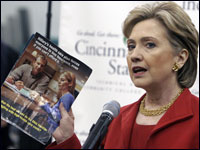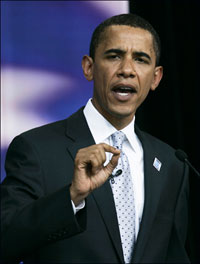Clinton, Obama and NAFTA: A Non-Issue?
Listen Now [4 min 37 sec] add to playlist
All Things Considered, February 26, 2008 · Illinois Sen. Barack Obama wants to make something clear: When it comes to hating NAFTA — the North American Free Trade Agreement — he's way out in front of his rival for the Democratic presidential nomination, New York Sen. Hillary Clinton.
"Sen. Clinton, as part of the Clinton administration, supported NAFTA," Obama says. "In her book, she called it one of the administration's successes."
The very suggestion that she might like NAFTA made Clinton furious.
"This is wrong," Clinton says. "And every Democrat should be outraged. So shame on you, Barack Obama."
The two candidates seem to really hate NAFTA. And they both seem to hate even more the idea that someone might get the impression that they don't hate NAFTA, or that one of them hates NAFTA a bit less than the other. To some, it's a bit odd that a 14-year-old trade agreement has suddenly become such a hot issue as the Democrats campaign in the run-up to the Ohio primary.
The North American Free Trade Agreement was signed in 1994. It's known as TLCAN in Mexico and ALENA in the French-speaking parts of Canada. NAFTA eliminated most tariffs — or import taxes — on goods moving from one of the three countries to another. Most economists believe this has been good, overall, for the U.S. economy. But like all trade agreements, NAFTA has hurt some industries, particularly some in Rust Belt states — which brings us to present-day Ohio.
Are Obama and Clinton right? Has NAFTA hurt Ohio's economy?
"Oh, absolutely not," says Ned Hill, economic development professor at Cleveland State University. "NAFTA is more political theater than an economic event."
Hill says Ohio is suffering economically; unemployment is high.
"But that is not due to NAFTA," he says. "That is because of the failed strategy of three companies" — General Motors, Ford and Chrysler.
U.S. automakers are suffering — largely, Hill says, because they don't make cars people want. So, their workers suffer, which means an auto state like Ohio suffers. Hill says NAFTA has helped the state — the agreement has, on balance, helped increase employment and raise Ohio's gross domestic product.
Hill is a centrist Democrat and supports NAFTA and free trade. Rob Scott, an economist with the Economic Policy Institute, a pro-labor, anti-NAFTA think tank, despises the agreement.
But as much as he doesn't like NAFTA, Scott says it's just not that important.
"More important was the formation of the WTO in 1994," he says. "And the entry of China into the WTO in 2001."
The WTO, or World Trade Organization, is like a global NAFTA. It lowers trade barriers in most countries, particularly China. The U.S. trade deficit with China is more than three times greater than with Mexico or Canada. So, if you think free trade hurts the United States, China is a much bigger threat than NAFTA. If you think free trade helps, China is far more helpful.
Which leaves some puzzling: Why do Clinton and Obama talk about NAFTA so much and not about other things, like China?
Pierrette Talley, secretary-treasurer of the AFL-CIO of Ohio, thinks she knows the answer.
"Workers know about NAFTA because we did a lot of education around the impact of NAFTA and what it would do when it was passing through legislation, back in the '90s," she says.
She says it was organized labor's last huge nationwide campaign — and it cemented NAFTA as a big issue in union members' minds. And, of course, anyone who wants to win the Ohio Democratic primary needs to win union votes. Candidates can try to explain that NAFTA isn't that important and focus on other issues, or they can just blame the other side for not hating NAFTA quite enough.
As it happens, Clinton and Obama have pretty much the same record on the issue. They both support the existence of NAFTA. They both call for its reform, along quite similar lines. Neither was in Congress in 1994, so they didn't vote on NAFTA when it passed. But they have both voted in favor of most free trade deals when they have had a chance.
Related NPR Stories
-
Feb. 26, 2008Where Clinton and Obama Really Stand on NAFTA
-
Feb. 25, 2008In Ohio, Delegates May Hinge on Job Issues
-
Feb. 23, 2008Union Support Swings Toward Obama
-
Feb. 24, 2008Separating Fact from Fiction: Obama Campaign Ads
-
Feb. 1, 2008Mexican Farmers Urge Changes to NAFTA
-
Dec. 8, 2003Reconsidering NAFTA on its 10-Year Anniversary


